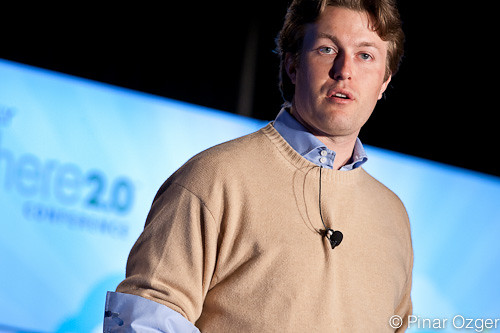Where 2.0: Facebook Places Focuses on ‘Pushing Up the Stack’

Facebook Head of Groups Justin Shaffer told attendees at Where 2.0 that one of Facebook’s goals is to develop the largest database of “interesting” places. The collection of places has “really been the focus” of his division for the past four to six months, he said. At the same time, the database of places is probably something of a commodity for Facebook, and other services. “The coordinates are approaching a commodity. But (we’re) pushing up the stack with services, etc.”
Shaffer, former CEO of Hot Potato, a group software site acquired last year by Facebook, said that a “social network” involves storytelling, memories and serendipity. The latter is “where friends check in and find you.” He added that a social network itself can be broken down into three basic elements: “Open,” “Geo” and “Temporal.”
Open would mean your social network acquaintances, Geo would be a friend’s photo of the Eiffel Tower, and Temporal would show the four people who are “here” right now. The importance of check-ins is “not really where you are, [it is about] who you are with,” he said.
Content-wise, it all splits into the “Open Graph,” “Data” and “businesses.” Data would include places and events, and businesses would include check-in deals and pages. While it would be ultimately helpful to develop standards, Shaffer warned that “everyone isn’t going to agree on meta data or categories.”
Speaking on a panel with Shaffer at Where, Fwix CEO Darian Shirazi, who has just raised a new $4.2 million round from Comcast Interactive Capital, agreed that the basic information is probably approaching commodity status. The challenge is to build a package that it unbeatable, said Shirazi. A listing of “The Top 10 Bars in San Francisco” would be an example.
Content, and geotagging of content, “is where this will realistically go,” added Shirazi. Fwix, a 22-person company that started two years ago as a news aggregator, is now expanding into vertical content areas such as real estate and video transcriptions. If Fwix could use places data to win even 1 percent of Google search results, it would be “huge,” he said.
